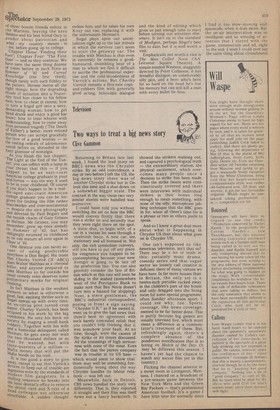Television
Two ways to treat a big news story
Clive Gammon
Returning to Britain late last week, I found the lead story on BBCI news was the Chrysler strike. By an odd coincidence, a day or two before I left the US, the big news story there was of another Chrysler strike but in Detroit this time and a shut-down on a somewhat bigger scale. The contrast in the way these two very similar stories were handled was instructive.
I could have told you without switching the set on how the BBC would convey firstly that there was a strike on and secondly that they were right there on the spot. A static shot, to begin with, of a car in a vacant lot seen through a steelmesh fence. A new car, see, stationary and all hemmed in. Not only, the rich symbolism conveys, will you have to put off any plans for vengeance you happen to be contemplating because your new Avenger is going to be late off the production line. You can also gloomily consider the fate of Britain which at this rate will soon be sliding to the seabed (somewhere west of the Porcupine Bank to make sure that Ben Nevis doesn't turn into a hazard for shipping). Next, a stern gentleman, the BBC's industrial correspondent, posing in front a sign saying "Chrysler U.K." as if he owned it, went on to give the bad news that. there'd been no agreement with such barely concealed relish that you couldn't help thinking that it was somehow your fault. At no time, though, were the causes of the strike or its issues discussed. All the trimmings of high seriousness with none of the meat. Even the fact that the parent company was in trouble at its US base — which would seem to show that there may well be something fundamentally wrong about the way Chrysler handles its labour relations — was left out.
Meanwhile, back in Detroit, CBS news handled the story very. differently, That is, they reported it straight and their film was itself news not a fancy backcloth. It
showed the strikers walking out, and captured a psychological truth — the extraordinary elation, the physical excitement, which overcomes many people once a decision to strike has been made. Then the strike issues were cons cientiously covered and there were interviews with individual strikers in their homes long enough to mean something, with none of the silly, microphone jabbing technique that the BBC goes in for, when all there's time for is a phrase or two as others jostle to speak.
And so I know a great deal more about what is happening in Chrysler US than about what goes on in Chrysler UK.
One isn't supposed to like American television, isn't that so?
There may be a lot of truth in this: certainly most drama, comedy series and that vague sector we loosely call creative is
deficient there of many virtues we have here. In far more houses than
in Britain, the only set is a twelve-inch portable tucked away in the children's part of the house and only dragged into the living room for some special programme, often Sunday afternoon sport. I
could see why, too. Sports coverage, like news coverage, seemed to be far better done. This is partly because big games are usually televised live, which must mean a difference in a commentator's treatment of them. But, refreshingly again, there's a complete absence of the ponderous nontification that is so boring on Match of the Day. (It may be different this season. I haven't yet had the chance to watch any soccer film yet in this country.) Flicking the channel selector in a motel room in Livingston, Montana, I chanced on a broadcast of a pre-season game between the New York Mets and the Green Bay Packers — that's professional American football. It's a game I have little time for normally since I find it too slow-moving and spasmodic! when it does move. But the on-air interpretation was so intelligent and so winning of attention that I stayed with the game, commercials and all, right to the end. I wish I could ever say the same thing about Grandstand.










































 Previous page
Previous page